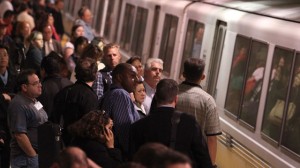By Isabel Angell

BART and its unions are still locked in negotiations, and Monday could bring the second strike this summer if there's no deal over the weekend. Last month's four-day strike caused massive commute delays across the Bay Area. Right now there's one surefire way to stop a strike.
If there is a BART strike Monday, Gov. Jerry Brown could step in and request an injunction to force a 60-day cooling-off period. But William Gould, who is a former chair of the National Labor Relations Board and a professor at Stanford Law School, said Brown probably doesn't want to go that route. It's seen as very anti-labor, and California is generally pro-union. But if the strike goes on long enough, that could change.
“The public undoubtedly—even in a state like this—when they're inconvenienced for a period of time, tends to blame the unions and the workers,” he said.
In most cities and states, it's illegal for public transit workers to strike—including historically pro-labor New York City. Governments have decided transit strikes are just too debilitating. Even Municipal Railway workers can't strike under San Francisco law. That got state Sen. Mark DeSaulnier, a Democrat from Concord, thinking. DeSaulnier, who also chairs the Senate’s Transportation and Housing Committee, said this latest stalemate has prompted him to look into legislation that could prevent future BART strikes.